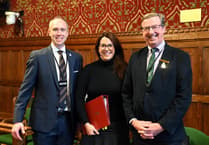MILLIONS of pounds worth of road safety schemes for Ceredigion and Powys are being scrapped in a bid to tackle climate change, a Welsh Government review that already put paid to Gwynedd's much-anticipated Llanbedr bypass has ruled – but a scheme on the A44 will go ahead.
Saying it needed to make climate change at the heart of decision-making, the Welsh Government put a freeze on dozens of road building projects last year while assembling a panel to review its options.
The Welsh Government announced today that it was backing the panel’s recommendations to scrap all safety schemes along the A487 and A470 in Ceredigion and Powys.
Projects included a £5.95 million scheme to improve safety on the A487 Llanrhystud is a “priority” due to “risky” overtaking from cars in both directions, and cars “speeding through the village”, and £17.4m scheme outside Aberarth, which would see the construction of two climbing lane sections to provide overtaking opportunities.
The Llanrhystud plan would have seen a new roundabout installed on the outskirts of the village, with an extra lane for a section of the stretch of road between Llanrhystud and Llanon.
Also now axed are safety schemes for the A470 at Llangurig, the A470 at Llanidloes, the A470 at Pont y Bat (Felinfach), and the A487 at Machynlleth.
The plans for Llangurig and Llanidloes on the A470 would have included overtaking lanes on both sites, with documents calling it a “priority” due to the number of collisions on that stretch of road.
The review said the six safety plans will “not be progressing in any form at this stage”, but said that “revised plans” could be considered in future.
A plan to increase safety on the A44 between Llangurig and Aberystwyth will go ahead however following the review, where there will be “continued development of safety and resilience schemes aligned to the future road building tests”.
The stretch of road regularly features in the top five most dangerous roads for collisions in the UK.
Public consultations on all those schemes were held, but no outcomes of the responses have been made available by the Welsh Government.
The one-mile bypass of Llanbedr in Gwynedd was the earliest casualty of the review, with the Welsh Government agreeing to scrap it in November 2021 despite it only being approved that March.
The review panel concluded it was likely to increase carbon emissions, but the decision left councillors and residents “angry and disappointed.”
Villagers are planning a protest march next month over the decision, saying it’s been “60 years since we could walk and cycle safely”, in Llanbedr.
Ceredigion Green Party called on both the A487 schemes at Llanrhystud and Aberarth to be scrapped ahead of the review, saying it “hoped that the Welsh Government sticks to its net zero commitment and stops spending money on making car travel easier.”
Deputy Climate Change Minister Lee Waters told the Senedd today “we will not get to Net Zero unless we stop doing the same thing over and over”.
“Let me be very clear at the outset, we will still invest in roads,” he said.
“In fact, we are building new roads as I speak - but we are raising the bar for where new roads are the right response to transport problems.
“We are also investing in real alternatives, including investment in rail, bus, walking and cycling projects.
“Even if we’d wanted to keep progressing all the road schemes in the pipeline we just do not have the money to do so.
“With fewer resources it becomes even more important to prioritise and the Roads Review helps us to do that.”
The roads review was announced by the Deputy Minister in June 2021 freezing all road building projects.
An independent panel was then created and tasked with reviewing the projects considered part of the review.
The panel, led by transport consultant Dr Lynn Sloman MBE, presented its findings to Welsh Government in September last year.
The findings come with some key recommendations from the panel, including four new road building tests that should: reduce carbon emissions and support a shift to public transport, walking and cycling; improve safety through small-scale change; help the Welsh Government adapt to the impacts of climate change; and provide connections to jobs and areas of economic activity in a way that maximises the use of public transport, walking and cycling.
While the move to scrap projects was welcomed by Mid and West Wales MS Jane Dodds – who said that “for too long, we’ve spent millions on new roads with no real improvements in road safety or congestion where we need it most”.
Welsh Conservative Shadow Minister for Transport, Natasha Asghar MS said the lack of an infrastructure plan for Wales has led to “mystery, mayhem and chaos.”
Ms Dodds added: “We now need a long-term plan to invest in safer roads, public transport, and tackling air pollution in our communities.”




